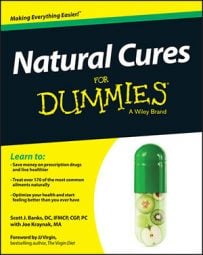Natural medicine is any healing practice that harnesses the power of nature, including the human body’s self‐defense and self‐healing mechanisms, to prevent and cure illness. Natural medicine includes the following practices:
Aromatherapy: Essential oils extracted from plants are used in numerous preparations, including massage oils and bath salts, to enhance physical and psychological well-being.
Ayurveda: This traditional Hindu system of medicine seeks to establish healthy balance in mind, body, and spirit through diet, herbal formulations, and yoga.
Biofeedback: This healing technique helps you control bodily processes normally thought to be outside an individual’s control. It does so by providing real‐time monitoring and information about those processes as you perform techniques to regulate them.
Chelation: Detoxification of heavy metals and other toxins from the body gets rid of harmful substances that your body isn’t geared to eliminate on its own.
Functional medicine: Functional medicine is personalized medicine that recognizes and addresses each person’s individual genetic uniqueness and the complex interactions among genes, diet, and lifestyle.
Herbal medicine: This practice treats illness with plants or plant extracts and is perhaps the oldest form of medical practice.
Homeopathy: Homeopathy treats illness by giving the patient minute doses of natural substances that would cause the same symptoms in a healthy person. The concept behind homeopathic remedies is similar to the concept behind vaccination, which deliberately exposes people to dead or weakened bacteria or viruses to protect them from infections caused by those organisms.
Massage and bodywork: Manipulation of the body, primarily the bones, muscles, and nerves, to relieve tension and pain, establish balance, promote detoxification, or treat specific conditions comes in many forms, including chiropractic adjustments, traditional massage, acupuncture, reflexology, rolfing, Reiki, and shiatsu.
Naturopathy: The Swiss Army Knife of natural healing, naturopathy uses numerous alternative treatments to promote healing and health, including diet and lifestyle counseling, herbs, homeopathy, massage, aromatherapy, acupuncture, and biofeedback.
Chiropractic treatment: Chiropractic treatment seeks to realign the spinal column and joints that cause pain and dysfunction related to the nerves, muscles, and organs of the body. Many chiropractors follow a functional medicine approach. Look for a chiropractor who’s received advanced training in functional medicine.
Nutritional medicine: This approach uses food along with vitamins, minerals, and other supplements as medicine to cure illness and optimize health.
No two individuals are alike; effective treatment requires a personalized treatment plan. Therefore, visit an Institute for Functional Medicine Certified Practitioner (IFMCP) doctor or a naturopath for an initial evaluation to determine whether you have any food allergies or sensitivities, nutritional deficiencies, digestive disorders, or genetic vulnerabilities that need to be addressed. To find a practitioner who has trained with the Institute for Functional Medicine, click Find a Practitioner. To find a naturopath, click Find a Doctor.

